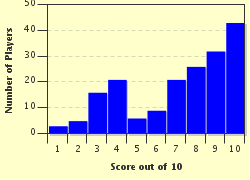
Navigating the Bible Trivia Quiz
Can you find your way around the Bible - without using the Contents page? This quiz uses the Protestant Christian Canon, and will work for any standard Bible which excludes the Apocrypha / Deutero-canonical books.
A multiple-choice quiz
by Rimrunner.
Estimated time: 4 mins.
- Home
- »
- Quizzes
- »
- Religion Trivia
- »
- The Bible
